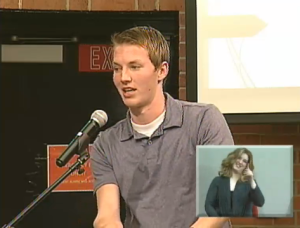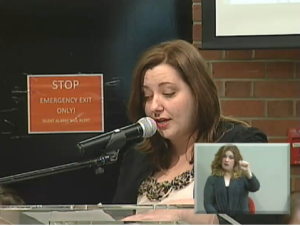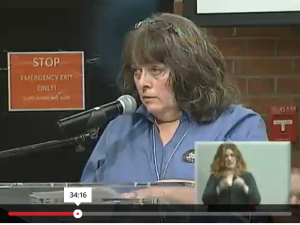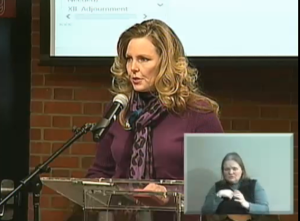This letter was written by a select group of Minors Lane Elementary Teachers on 1/15/16.
 On January 13th, 2016, Jefferson County Board of Education member, Chris Brady, who represents District 7 in the eastern part of Jefferson County, voiced his disapproval for the district budget proposal. The budget proposal would increase class sizes, therefore reducing the number of teachers per school, and eliminate assistant principals from some JCPS schools. While we agree that a reduction in staff would be detrimental to the learning of all students in Jefferson County, we are outraged that he would suggest the closing of Minors Lane Elementary School as a cost-saving alternative.
On January 13th, 2016, Jefferson County Board of Education member, Chris Brady, who represents District 7 in the eastern part of Jefferson County, voiced his disapproval for the district budget proposal. The budget proposal would increase class sizes, therefore reducing the number of teachers per school, and eliminate assistant principals from some JCPS schools. While we agree that a reduction in staff would be detrimental to the learning of all students in Jefferson County, we are outraged that he would suggest the closing of Minors Lane Elementary School as a cost-saving alternative.
First and foremost, Minors Lane is a neighborhood school. Brady stated that the neighborhood that once surrounded this school is gone. Although there are industrial warehouses near our school, we serve over 250 students who live directly across the street.
Minors Lane Elementary serves a unique and diverse population with distinct challenges.
- 5% “Kindergarten Ready” (lowest in JCPS, 2nd lowest in state)
- 96% Free/Reduced Lunch (yearly numbers are not finalized, but likely highest in JCPS)
- 45% English Learners (highest in JCPS)
- 25 countries represented by students
- 20 different languages spoken within student population
 Our school is equipped with many resources that support and meet the diverse needs of these students and their community. We have three English as a Second Language teachers, one shared ESL Goal Clarity Coach, in-house Spanish and Arabic interpreters that serve students as bilingual instructors, multiple ECE teachers, a speech pathologist, and an accommodating Family Resource Center. Some of our students receive two or more of these services when they set foot in the building each day. They are able to attend a school where diversity is celebrated and they are not a minority. Eliminating a school that services so many needs, so extensively, would be a crime.
Our school is equipped with many resources that support and meet the diverse needs of these students and their community. We have three English as a Second Language teachers, one shared ESL Goal Clarity Coach, in-house Spanish and Arabic interpreters that serve students as bilingual instructors, multiple ECE teachers, a speech pathologist, and an accommodating Family Resource Center. Some of our students receive two or more of these services when they set foot in the building each day. They are able to attend a school where diversity is celebrated and they are not a minority. Eliminating a school that services so many needs, so extensively, would be a crime.
The location of the school provides our community easy access to resources that would otherwise be out of reach. Eliminating Minors Lane Elementary would create additional hardships for parents, specifically communication and transportation. A large number of our students’ guardians do not drive but are able to participate in parent-teacher conferences and other school activities because of the proximity to their homes. Additionally, the Family Resource Center at M.L.E. addresses many needs of these families. The TARC bus does not stop anywhere close to these neighborhoods, so the parents would not be able to get to their children’s schools if they went somewhere else. Closing our school and its many resources would put the families from the surrounding neighborhoods at a further disadvantage than they already are. These neighborhoods are already isolated and if Minors Lane Elementary is closed, a crucial part of their community and their only community resource would be taken away.
 The following letter was written by a former Minors Lane Elementary student.
The following letter was written by a former Minors Lane Elementary student.
Hello, my name is Alisa B.,
I am a former student of Minors Lane. I am now a ninth grader. I have to say that Minors Lane has been by far my favorite school I have attended in my whole life. The staff here isn’t just teachers, administrators, coaches, etcetera, they are like family. The teachers build bonds with the students. There wasn’t ever a time when I didn’t have anyone to turn and talk to. The teachers at Minors Lane will go out of their way to make sure their students are safe and okay. I was going through issues when I went to Minors Lane, and thankfully I had many people to turn to and help me through it all. Minors Lane definitely taught me a lot. I didn’t only learn my required standards, but I also learned respect, kindness, character, etc. In addition, the teachers are amazing at their jobs. My teachers never moved on to the next standard until he/she knew everyone understood everything clearly. I wouldn’t be who I am if it weren’t for Minors Lane and the staff. I always felt safe there. To this day, I still look back on the lessons I learned, the people that helped me through intervening obstacles, the fun I had, and the family I developed. I still talk to a lot of my friends I made there. I attended Minors Lane as a shy girl, and graduated as a stronger and more intelligent person. Minors Lane perfectly prepared me for middle school. My favorite thing about Minors Lane is how it’s so different from other schools I’ve attended. I have never gained close relationships at any other school like I have gained at Minors Lane.
The following is a statement from a parent at Minors Lane.
I filed a hardship transfer in order for my child to attend Minors Lane Elementary. I have a child with Down Syndrome. My husband and I shadowed five schools before deciding on Minors Lane Elementary. The other four schools we shadowed could not compare to the genuine compassion we saw at this school towards its children. Our son has been included in a typical classroom which has not only helped him grow and develop with his neuro-typical peers, but has helped his classmates understand the special needs of an individual with a disability. It would be a travesty to close this school. The team that this school has developed to help my child is beyond compare. If this school has done so much for my child, who has a diagnosis, I can’t imagine what the school is doing for the neuro-typical children. Seeing this school dismissed in this way is heartbreaking.
Minors Lane is not just a school, it is a family. We meet the needs of our students academically, socially, and emotionally. We provide stability and security to students and families who come to us impoverished. Taking away Minors Lane is like taking away our students’ extended family.
Signed,
A Group of Minors Lane Elementary Teachers





 On January 13th, 2016, Jefferson County Board of Education member, Chris Brady, who represents District 7 in the eastern part of Jefferson County, voiced his disapproval for the district budget proposal. The budget proposal would increase class sizes, therefore reducing the number of teachers per school, and eliminate assistant principals from some JCPS schools. While we agree that a reduction in staff would be detrimental to the learning of all students in Jefferson County, we are outraged that he would suggest the closing of Minors Lane Elementary School as a cost-saving alternative.
On January 13th, 2016, Jefferson County Board of Education member, Chris Brady, who represents District 7 in the eastern part of Jefferson County, voiced his disapproval for the district budget proposal. The budget proposal would increase class sizes, therefore reducing the number of teachers per school, and eliminate assistant principals from some JCPS schools. While we agree that a reduction in staff would be detrimental to the learning of all students in Jefferson County, we are outraged that he would suggest the closing of Minors Lane Elementary School as a cost-saving alternative. Our school is equipped with many resources that support and meet the diverse needs of these students and their community. We have three English as a Second Language teachers, one shared ESL Goal Clarity Coach, in-house Spanish and Arabic interpreters that serve students as bilingual instructors, multiple ECE teachers, a speech pathologist, and an accommodating Family Resource Center. Some of our students receive two or more of these services when they set foot in the building each day. They are able to attend a school where diversity is celebrated and they are not a minority. Eliminating a school that services so many needs, so extensively, would be a crime.
Our school is equipped with many resources that support and meet the diverse needs of these students and their community. We have three English as a Second Language teachers, one shared ESL Goal Clarity Coach, in-house Spanish and Arabic interpreters that serve students as bilingual instructors, multiple ECE teachers, a speech pathologist, and an accommodating Family Resource Center. Some of our students receive two or more of these services when they set foot in the building each day. They are able to attend a school where diversity is celebrated and they are not a minority. Eliminating a school that services so many needs, so extensively, would be a crime. The following letter was written by a former Minors Lane Elementary student.
The following letter was written by a former Minors Lane Elementary student.